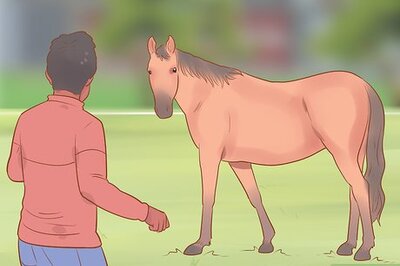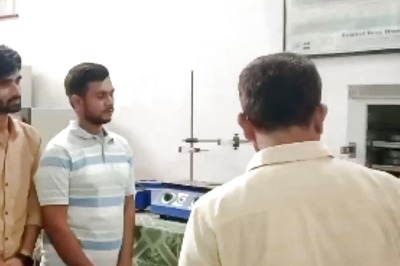
views
Sizing

Align the jacket shoulder seams with the edge of your shoulders. A fitted shoulder gives you a crisp look. Put on the jacket and check that the shoulder seam ends just before your shoulder does. If it’s perfectly aligned with your shoulder, that works, too. If it goes beyond your shoulder, try a different jacket that fits better. Nailing the shoulder width is very important because it can’t be tailored afterward. To test the shoulder width, lean against a wall. If your shoulder hits the wall before the jacket shoulder, then the width is right. If the jacket shoulder pad hits the wall first, then it’s too big.

Get a jacket with high arm holes that are even with your armpits. Low arm holes make the suit look droopy and restrict your range of motion. so get a jacket with arm holes that rest even with your armpits. Test the jacket by moving your arms up and down. The jacket should stay in place as you move and you should be able to move around freely. Make sure the holes don’t scrunch at all in your armpit. This looks sloppy and means the holes are too high.

Check that your knuckles line up with the jacket's bottom hem. Put the jacket on, stand up straight, and droop your arms to the side. On a well-fitting jacket, the bottom hem should be just about even with your knuckles. This way, it won’t look too long or too short. Some men prefer a shorter jacket, which is also acceptable. This works well for less formal occasions and a slim-fitting jacket. Trends for jacket length change, and a lot of it is up to personal taste. Feel free to play with this rule if you see a jacket you like that isn’t quite the right length.

Confirm that the sleeves reach just above your wrist. A standard jacket sleeve should show about half of your shirt cuff. For most men, this means the sleeve should stretch to just about your wrist. Hold your hands at your sides to check if the sleeve length is right for you. The sleeve length is very variable, and some men prefer them lower or higher. It’s not a make-or-break feature for most suits. It’s easy for a tailor to adjust the sleeve size, so you can always make changes later on if you decide you don’t like the fit.

Button the jacket to make sure it lies flat on your chest and torso. The jacket should look crisp and slim when it's buttoned. Button yours up and make sure the lapels are resting flat against your chest. If they're pushing up or bunching, then the jacket is too big. Also push your thumb between the button and your stomach. It should feel a little snug. If not, then get a jacket that fits a big tighter. If the jacket sits too loose on your chest or torso, a tailor can make alterations to fix this. Don't reject a suit for these issues if you really like it.

Pick a lapel type that matches the occasion. There are 2 main lapel types on suit jackets, notch and peak. There aren't many strict rules for lapel types, but generally a peak lapel is for fancier occasions. Pick the type that matches the event you're attending. A notch lapel has a slight notch, as the name implies, around your shoulder. This is the most common and reliable type, and you can't go wrong with this for everyday use. A peak lapel juts out and points toward your shoulders. This is a bit flashier and more common at fancy parties and events, but a notch lapel will work just fine for these events too. There are also shaw lapels, that are straight the whole way down. These are more common on tuxedos though.

Leave little or no overlap on your shoes when you get pants. This is the pant break, or how much of the pant droops over your shoes while you’re standing. In the modern style, pants leave little or no break, meaning they stop right where the shoe begins. This shows some ankle and makes the pants look nice and crisp. If you’re getting pants with a small break, make sure you wear socks that match! Hemming the pants is very easy, so you don’t have to stress about getting the pants length perfect.
Colors and Patterns

Get charcoal gray or navy blue for a classic, easy-to-match suit. These 2 colors are the most common for modern suits, and will give you a nice, crisp look. They’re also neutral colors, so it's very easy to match them with different ties, shoes, and accessories. You can’t go wrong with either of these. While navy is a classic color, steer away from lighter blue colors unless you’re attending an informal event. Choose a darker gray for more formal events. A light gray suit is great for everyday use.

Wear black suits for formal or nighttime occasions. A black suit is classic, but it’s not very popular for everyday use anymore. However, a black suit is still a great choice for nighttime events or formal occasions. Try this style to look like the sharpest person in the room. Pros recommend making sure that the suit fits especially well if it’s black. Go for a slimmer fit than you might normally so you look crisp.

Try plaid in a neutral color to be less formal. You don’t only have to wear solid colors. Plaid is a great way to make a statement at a less formal event. If you go with plaid, stick with your neutral gray and navy colors. This way, you’ll look great without being too loud or noticeable. You can also get plaid suits in less conventional colors like green or brown. You can definitely look good in these styles too, but save them for very informal occasions.

Complement the suit color with a slim-fitting shirt. If your shirt is too big, it’ll wrinkle as you’re sitting and moving around, making you look unkempt. Get a slim-fitting dress shirt with sleeves that rest at about the base of your palm. This way, 1–1.5 in (2.5–3.8 cm) of the sleeve will show while you’re wearing your jacket. Remember to make sure the shirt matches the color of your suit too. White is always a good choice for a shirt color. It goes with everything. Light or baby blue pair well with a navy suit. Black or purple work well with gray suits. It’s best to get some well-fitting shirts in a few different colors so you’re always ready for a special occasion.
Suit Styles

Get a single-breasted suit for a reliable classic. Most suits are single-breasted, and they'll work for almost any occasion. One a single-breasted suit, there is 1 line of buttons, usually 2 but sometimes 3, along the seam. This gives you a nice, slim look. You can never go wrong with a single-breasted suit, so get one of these for everyday use. There are some rules for buttoning a single-breasted suit. For a 2-button suit, keep the top button fastened while you're standing and unbutton it when you sit. For a 3-button suit, button the middle one instead, and the top one only if you want to. Never button the bottom one.

Go for a double-breasted suit for more formal occasions. Unlike a single-breasted suit, a double-breasted suit has buttons on both sides of the jacket for decoration. This is generally reserved for more formal occasions and meetings. If you want to present a more formal image, then pick a double-breasted variety. Double-breasted suits usually don't fit as snugly as single-breasted ones, but modern ones are more slim than classic styles. On a double-breasted suit, always leave the bottom button open and keep the top one fastened whether you're sitting or standing.

Add more character with a three-piece suit. A three-piece suit adds a vest that matches the jacket. This isn't required for any particular occasion, but it adds a lot of style to your appearance. Try the three-piece if you want to turn some heads when you enter a room. If you're at a less formal occasion, then you'll look great if you take the jacket off and just hang out in your vest.
Accessorizing

Wear shoes and a belt that match your suit. You can never go wrong with nice leather dress shoes with standard laces. This style matches pretty much every suit. The 2 basic colors are black and dark brown. Either of these colors will go with the main neutral colors, brown and navy. If you get a black suit, be sure to match them with black shoes. No matter what color your shoes are, make sure you get a belt that matches. This is a great way to coordinate the colors on your outfit. It’s best to have 2 pairs of shoes in each color. That way, you can easily match your suits quickly. You could also go for a lighter shoe color like tan. This is best for informal events or everyday wear. For informal events, some men like to wear stylish sneakers like Converse with their suits. You could make this work, but you won’t look as clean and crisp. Some suits don’t have belt loops. In this case, wear suspenders.

Pick a simple tie that complements your suit color. It’s best to keep your tie simple, so avoid any crazy designs or colors. Simple stripes, small dots, or just a solid color all work well with any suit. Also go with colors that completement or match the suit. Reliable choices include black, navy, red, blue, or purple. Try to avoid brighter colors like pink or yellow. This makes a suit look less formal. However, it could fit for some occasions, like an outdoor party in the summer. You could also break the mold a bit and wear a bowtie instead. This will set you apart from the crowd. For less formal events, you can also look great skipping the tie and leaving your top button open. Make sure you wear a V-neck undershirt so it doesn't show.

Accent your suit with a matching watch. A watch isn’t crucial, but it can add some nice character to your suit. You have tons of options for watch styles. In general, choose a strap color that matches your belt and shoes. Also try to match the watch to the formality of the event you’re attending. For example, don’t wear a digital sports watch to a wedding. These simple tips should help your watch really complement your suit. For very formal events, choose a simple watch. It shouldn’t be showy or overpower your outfit. If you wear watches, you’ll look sharper if your sleeves are a little shorter to show off your watch. If you really want to stand out, try a pocket watch instead of a wristwatch.

Try a tie clip and cufflinks to bring the whole outfit together. These are optional accessories, but they can really make your suit pop. A nice tie clip and pair of cufflinks adds some character to any suit. Try getting a nice silver clip and links, which matches any color. You could also get cufflinks in other colors like gold, but silver is the most modern look.




















Comments
0 comment